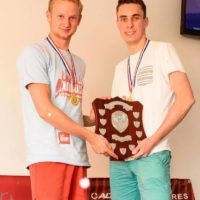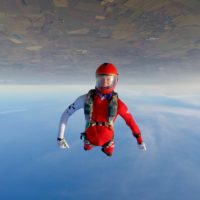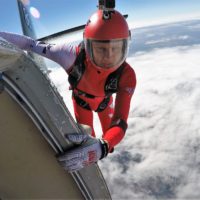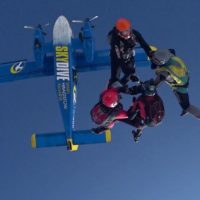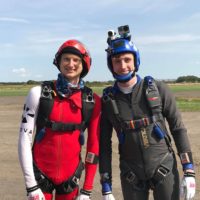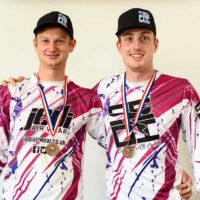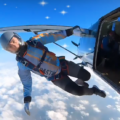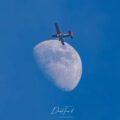- Swallow Group Dropzones:
- Skydive Hibaldstow
- Skydive Spain
- Skydive Algarve
An Interview With Team Nova
Thursday, July 4, 2019
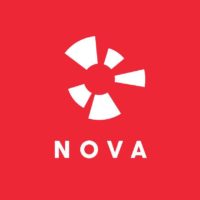 Team Nova are made up of performer Ed Cracknell and camera flyer Chris Mayhew. Over the last few years, they have been making a name for themselves in the world of freefly and freestyle. They’ve got big international competition plans this year – read their inspiring story below, what motivates them and what their ambitions are.
Team Nova are made up of performer Ed Cracknell and camera flyer Chris Mayhew. Over the last few years, they have been making a name for themselves in the world of freefly and freestyle. They’ve got big international competition plans this year – read their inspiring story below, what motivates them and what their ambitions are.
1. To start with, can you both give an introduction of your skydiving story so far.
Ed (performer): In 2014 during my first year of university, I checked out the skydiving club in freshers, but never joined as I thought it would be too expensive. Then halfway through the first year, I ended up getting some extra money from student finance, so I immediately applied for an AFF course at Langar and ended up doing it with Milko and Sian – they were awesome!! Five years later, I now have around 900 jumps and work as an iFLY wind tunnel instructor.
Chris (camera): I have about 1400 jumps and I started skydiving back in 2008. In terms of competition experience, I first competed back in 2015 and have a few years’ experience with various indoor competitions including 2 and 4-way dynamic, Vertical Formation Skydiving (VFS) and solo freestyle. I also have some outdoor discipline competition experience including freestyle and VFS. So far, I’ve taken 7 bronze, 2 silver and 2 gold (intermediate) medals.
2. How did you end up being on a team together?
Ed: After winning the Freestyle B category at the UK National Championships, my old cameraman wanted to concentrate on other disciplines within skydiving. Chris and I met at Langar jumping during New Year’s Eve some 3 years ago and after Chris became available after 1 year of filming freestyle for a team that was no longer competing, we teamed up and we haven’t looked back since.
3. What is it about the discipline of Freestyle that you particularly enjoy?
Ed: Freestyle is a very artistic and creative skydiving discipline, so when at the beginning of the season, all possibilities of human flight can be explored and attempted. Once a routine is created and drilled, then the next stage involves repetition and polishing everything off up to competition time. That’s a simplistic one-sentence description of the huge amount of work, thought, analysis, training, fault-fixing and tidying up during the process of creating the routine. The enjoyment is as much about the journey as it is attending a major competition. And, I love the fact that we get to start over after competitions.
4. What makes for a good freestyle cameraman, how do you work out where to be and what works in a routine?
Chris: So, this is a great question. To be a good freestyle camera flyer, in my opinion, you need to be able to fly some basic lines and really know how to fly them well (in-face carve, belly and back-tracking) and eagles (which is a move where two or more people fly around each other on the vertical axis) to the point where you don’t have to think about the moves – you can just fly them. Once you have mastered these, then you can focus your energy on framing and proximity to the performer. It’s hard to focus on both at the same time, especially when you are learning how to fly.
About how I work out where I need to be during the performance, this is the wrong way to phrase the question. It is not where I should be, nor is it where Ed should be. You should think of it like two people flying around an imaginary ball – we are both flying for each other, I just happen to be wearing a camera. One really good way of demonstrating this is to watch a video of our free routine from the outside, which we will release after the 2019 British Nationals – watch this space!
5. Do you have a coach, how you selected them and what does he or she bring to the team?
Ed: Our coaches are Will Penny and Yo Abby – they’re both very valuable to us. It’s always good to train with the best and they are both multiple times world champions. Specifically, Will is very good at the camera side of things and helping us with the psychology. I really enjoy asking Yo direct questions about the performer side of things and get lots of help from him to save me time and effort.
6. Ed mentions the importance of the psychology side of the discipline. Why is the psychology an important part of freestyle and how do you train for it?
Chris: I completely agree with Ed about having a good mental state of mind whilst training and especially whilst competing. You must have a laser focus on the routine you are about to fly and know it back to front. We spend a lot of time on the ground “walking” our routine (to odd looks sometimes from bystanders…) which really helps cement it into the mind. My previous experience with VFS has taught me that whatever you do on the ground, you do in the sky. Once you have left the plane, you both have a certain job to do and if one person forgets a move or has a mild blip in concentration it can be hard to get the “flow” back again and the routine is compromised.
7. What are your team objectives over the next few years?
Ed: Our direct competition in 2019 are Team FSU, I really appreciate that there is another UK team that have scored similar to us in the past in the fight for freestyle as it forces us to train harder and be better. This year we have the UK National Championships and World Cup in Eloy, Arizona, USA. Next year, if we place 1st or 2nd in UK nationals, then we will go to the World Championships in Russia 2020 which is a Mondial (where all the disciplines are completing at once place). I will also be doing Indoor Freestyle next year at the 2020 World Cup of Indoor Skydiving in Liege, Belgium. Exciting times ahead!
8. Who are your skydiving team or individuals influences who have inspired you?
Chris: There are so many people and teams that inspire me in this sport it is difficult to really mention specific names. Of course, Flynamik (Yo Abby and Will Penny) are our inspiration in terms of what they have achieved in competition and, as individuals, good coaches too. Other people that have inspired me over the years are Rafael Schwaiger, Martin Kristensen and the late Ty Baird.
9. Do you have any advice for starting out in the world of Freestyle?
Chris: The barrier to entry for competitive freestyle at a national level is relatively quite low. You can enter British Nationals Freestyle B category, which only contains head-up moves for example. So as soon as you have learned to fly head up, you can give it a go. As you move into Freestyle A which comprises head-down flying, then the difficulty increases. Both the camera flyer and performer need to have some tunnel flying experience in order to learn some of the moves and flying lines – but don’t let that put you off if you are just starting out.
Go find a camera flyer and go try out some moves, then ask team NOVA for some coaching. We coach at skydive Hibaldstow every month and can even coach up and coming freestyle teams.
10. Lastly, any funny stories to tell?
Chris: None that I can go into in too much detail in written form… but just ask Ed about any of the following topics: Ed looking everywhere for his rig on a boarding call and finding it by his feet, Ed going off for a 1 man party, our team missing a boarding call and a trip to Australia… I could go on forever. Hopefully, I can tell you the story of us winning World Gold, but you may have to wait some years for that to happen…
When You Can Catch Team Nova At Skydive Hibaldstow IN 2019
We’re pleased to have Nova with us for a monthly residency this year. See them here on the following dates:
- 20-21st July
- 10-11th August
- 21-22nd September
- 19-20th October
We are so social...
Follow Us!
Stay connected with us! Sign up to receive news and valuable promotions from Skydive Hibaldstow! We won’t spam you (we promise).
Copyright © 2024, Skydive Hibaldstow, All Rights Reserved.
DropZone Web Design & Marketing by Beyond Marketing, LLC
